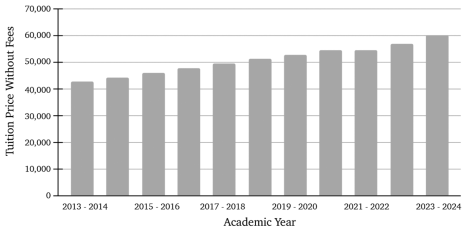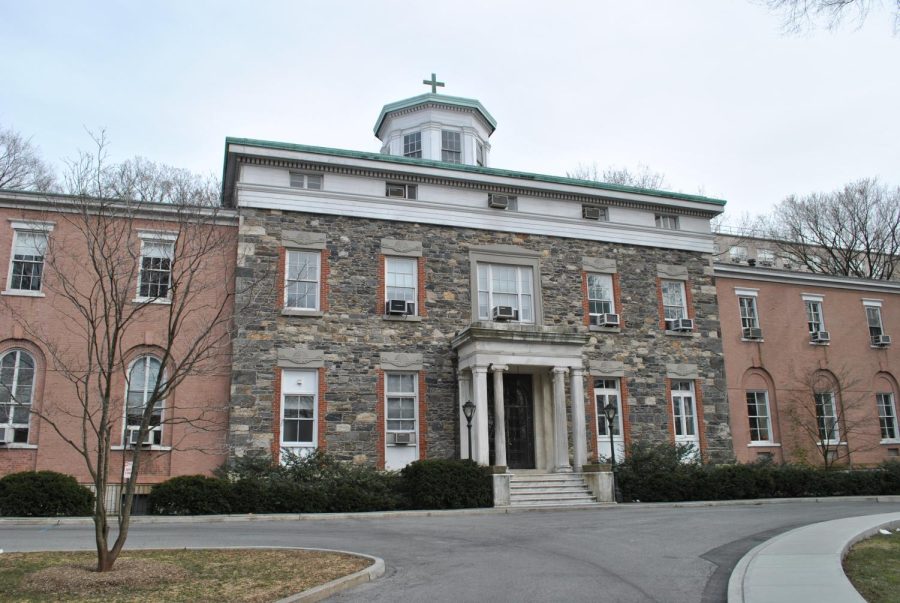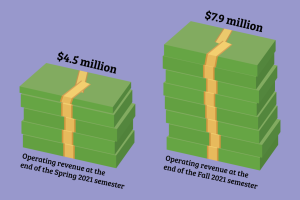Fordham Raises Undergraduate Tuition by 6%
Undergraduate tuition and room-and-board fees will both be raised by 6%, but the university intends to allot $10 million in financial aid for families who cannot accommodate the increase
HOWCHOU VIA WIKIMEDIA COMMONS
Tetlow expressed that the university is focused on reducing costs, but the tuition increase is still necessary. Students have been impacted by the financial burden, with some changing their undergraduate plans.
April 20, 2023
In two emails sent to students, faculty, staff and administrators on March 30, University President Tania Tetlow, J.D., announced that Fordham will be increasing undergraduate tuition and room-and-board fees by 6% for the 2023-24 academic year. She pointed to lingering financial effects of the COVID-19 pandemic, inflation and faculty compensation demands as reasons for the increase.
Inflation rates have been decreasing slowly since the end of June 2022, when they peaked at 9%, according to data from the U.S. Bureau of Labor Statistics. According to its consumer price index (CPI) summary, the inflation rate, which is 4.98% as of March 31, is about 3% less than the average inflation rate of 2022. These rates are above the Federal Reserve’s target of 2%.
With the recent spike, tuition fees have risen overall by 40.83% over the past decade at Fordham. Ten years ago, in the 2013-14 academic year, tuition was $42,845; comparatively, inflation has increased by 20.76% from 2013 to 2022. For the 2022-23 academic year, tuition cost $58,467.
Throughout the 2012-13 to 2017-18 academic years, Fordham had steadily increased its tuition by about 3.75% each year. Subsequently, throughout the 2018-19 to 2020-21 academic years, Fordham lowered its standard tuition hike and increased tuition by about 3.31% each year.
“The reality is that the same inflation that’s kicking all of your families so hard is also hitting Fordham’s cost and everything from utilities (to) insurance to things there’s not much we can do about,”University President Tania Tetlow, J.D.
The university did not increase tuition during the 2021-22 academic year in order to provide relief to families suffering financially from the pandemic, a decision made during former University President Joseph M. McShane’s S.J., tenure. For the following 2022-23 academic year, Fordham increased tuition by 4% to make up for the lack of an increase the year prior.
Fordham is one of many universities across the nation to announce a large tuition increase for the upcoming academic year. According to Forbes, Stanford University is increasing its tuition by 7%, and other universities such as Duke University and Georgetown University are increasing theirs by 4.9%. Notably, Stanford announced on Feb. 9 that students with an annual household income of less than $150,000 will have their entire tuition bill covered by financial aid.
Tetlow also disclosed that the university will be allocating an additional $10 million to its financial aid budget to compensate for students and families who may not be able to afford the tuition spike.
According to US News and World Reports, as of 2020, the most recent year for which data is available, the average need-based scholarship or grant awarded to first-year students at Fordham University was $31,974, with 71% of incoming students receiving need-based financial aid.
In an effort to connect more with the student body, Tetlow hosted an hourlong virtual town hall on April 3. Both undergraduate and graduate students were invited to join over Zoom. The president began with opening remarks in which she expressed how beneficial it has been to hear from students through her recently implemented office hours. Students were encouraged to send in questions for the question-and-answer portion that occurred next. Michele Buris, associate vice president for student affairs, relayed these questions to Tetlow from students.
The first question addressed the reasoning behind the tuition increase. Tetlow explained that the university has made reducing costs a priority. She also noted that it is difficult to do so without affecting the quality of students’ education.
“The fact is that we need to provide you with the kind of excellence that you require,” she said. “There’s a world where we could disaggregate those two things and what you pay would not be connected to what we offer, but the reality is that we’re a university that’s 90% driven by tuition and fees and residence hall revenue.”

Tetlow expanded upon her explanation of the university’s decision and how inflation has significantly increased Fordham’s costs.
“The reality is that the same inflation that’s kicking all of your families so hard is also hitting Fordham’s cost and everything from utilities (to) insurance to things there’s not much we can do about,” she said.
The president also emphasized that financial aid is “the highest budget priority” of the administration ahead of the tuition increase.
“Before the tuition increase, graduating early seemed like an exciting option. Now it’s a priority. I’m taking a summer class and trying to get in touch with my deans to be completely sure that I will be able to graduate next fall.”Vivian Picciotti, FCLC ’23
Although the university is increasing tuition fees by 6%, Tetlow noted that due to a decline in graduate school enrollment, the university’s total revenue will only be increasing by 2%. She added in her email that the graduate and professional programs will have generally lower tuition increases.
Fordham’s sticker price, which includes tuition and fees, will increase from $56,920 per year to $60,335 for the upcoming academic year. This has caused some students to reconsider their educational path at Fordham.
Vivian Picciotti, Fordham College at Lincoln Center (FCLC) ’23, is now graduating in December 2023. She decided to graduate a semester early in response to the announcement.
“Before the tuition increase, graduating early seemed like an exciting option. Now it’s a priority,” she said. “I’m taking a summer class and trying to get in touch with my deans to be completely sure that I will be able to graduate next fall.”
“I was awarded the same package, so it became a no-brainer to leave Fordham if they were going to continue raising the price of the already-expensive education,”Parker Estrella, FCLC ’25
Picciotti also noted that although tuition has increased twice since her first year, her awarded scholarships have not kept up with the rising costs.
Parker Estrella, FCLC ’25, is a transfer student from the University of Portland. He originally applied to Fordham as an incoming first-year but declined his acceptance because Fordham’s tuition was not affordable to him, even with the scholarships and financial aid he received.
For his first year, Estrella was able to attend the University of Portland at a very low tuition rate, but his plan was always to move to a larger city for college. Due to the rising cost of living in New York City and now the tuition increase, Estrella has decided to transfer back to the University of Portland.
“This year has been enjoyable. However, I was still stretching to make ends meet for my off-campus living expenses,” he said.
Estrella was already considering leaving Fordham because of the high cost of attendance this year.
“I was awarded the same package, so it became a no-brainer to leave Fordham if they were going to continue raising the price of the already-expensive education,” he said.
“The cost keeps increasing, and I can’t take advantage of all the courses and resources that Fordham offers because I can’t afford to stay here.”Vivian Picciotti, FCLC ’23
Anushka Rao, FCLC ’26, has not had to reevaluate her education at Fordham, but she said that she is extremely fortunate and noted that many families have to be extra-conscious of their financial situation now.
“With my family, we have to be more cautious of tuition costs and budgeting,” Rao said. “But, we’re privileged enough to have it not be that big of a deal, unlike others.”
Ada Holmes, FCLC ’26, echoed similar sentiments about the announcement’s timing. She suggested that the administration implement the tuition increase for incoming students rather than ones currently attending the university.
“It’s unfair to increase it after people have already committed to paying a certain amount,” Holmes said.
The president also emphasized that financial aid is “the highest budget priority” of the administration ahead of the tuition increase.
Students have also shared that the tuition increase will negatively affect the quality of their college experience. Picciotti noted that she will not be able to take advantage of some opportunities Fordham offers now that she is graduating early to save money.
“I feel like I’m missing out on taking more electives. I’m not graduating with a minor because it would mean taking more classes, and I can’t spend thousands of additional dollars for that,” she said. “The cost keeps increasing, and I can’t take advantage of all the courses and resources that Fordham offers because I can’t afford to stay here.”
Estrella noted that he was hoping to continue the close friendships he fostered while attending Fordham. Throughout the span of his two semesters at Fordham, Estrella says he has gained a close group of friends with whom he enjoys going out to dinner and playing basketball.
“I think transferring kind of screwed me over because I lost connections with people back home at my school, and now I have to make new connections or revamp those ones,” he said.
Rusmika Nabiha, FCLC ’25, commented on how the added financial stress from this tuition spike will likely affect the mental health of the student body.
“Students have become more focused on the cost of their education than the education itself,” Nabiha said. “Knowing that many of us will have hundreds of thousands of dollars in student debt upon graduation is highly demotivating.”















